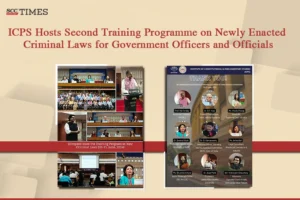The Institute of Constitutional and Parliamentary Studies (ICPS) has successfully conducted its second training programme on newly enacted criminal laws on 20th and 21st June, 2024. Building on the success of the inaugural session held on May 29th and 30th, which saw over 100 nominations and garnered outstanding feedback, this second programme attracted more than 80 officers and officials. Organized for officers/officials from various ministries of the Government of India, state assemblies, and Union Territories, this initiative aims to prepare legal practitioners for significant changes in India’s criminal justice system, effective from July 1, 2024. The newly enacted laws—Bharatiya Nagarik Suraksha Sanhita, 2023, Bharatiya Nyaya Sanhita, 2023, and Bharatiya Sakshya Adhiniyam, 2023—are set to replace the outdated Indian Penal Code, Code of Criminal Procedure, and Indian Evidence Act, respectively, addressing contemporary issues and enhancing legal efficiency.
The ICPS, a premier research institute headed by the Hon’ble Speaker of the Lok Sabha, who serves as its ex-officio President, was established to organize academic, research, and training programmes in constitutional and parliamentary studies. The Institute functions as an advanced research center and a vehicle for the popular dissemination of democratic values, bridging the gap between statesmen, academicians, researchers, and practitioners in the field.
The introduction of these new laws marks a monumental shift in India’s legal landscape. The Bharatiya Nagarik Suraksha Sanhita, 2023, introduces provisions to tackle modern crimes such as cyber-crimes, organized crime, and environmental offenses, ensuring that the legal framework remains relevant amidst technological advancements and evolving societal challenges. The Bharatiya Sakshya Adhiniyam, 2023, addresses the growing importance of digital evidence by incorporating provisions for the admissibility and authentication of electronic records, digital communications, and forensic digital analysis, which are crucial in today’s digital age. The Bharatiya Nyaya Sanhita, 2023, focuses on enhancing community security and public order, adapting to the dynamic nature of public safety, and reinforcing the role of law enforcement agencies. These reforms aim to create a more efficient, transparent, and just legal system, emphasizing clarity, accountability, and community engagement.
The Ministry of Home Affairs (MHA) has played a pivotal role in recommending that ICPS carry forward this essential training programme. Recognizing the importance of these legal reforms, the MHA has entrusted ICPS with the task of educating and equipping legal professionals with the necessary knowledge and skills for the effective implementation of these new laws. This partnership underscores the critical role that continuous education and training play in the successful transition to a modernized legal framework.
The 2nd training programme featured distinguished faculty comprising of Prof KA Pandey, Dr. B.T. Kaul, Ms Prachi Pratap, Dr Seema Singh, Dr. B Ramawamy, Ms Anika Bali, Ms Bhumika Indulia, Dr Asad Malik and Mr Vishavjeet Chaudhary, who provided in-depth insights into the various aspects of these new laws.
ICPS Training Programme
The programme includes three panel discussions, each focusing on one of the new laws and featuring 2-3 expert resource persons. Each discussion is followed by a question-and-answer session, allowing participants to engage directly with the experts and gain a thorough understanding of the reforms. Attendees are encouraged to reserve their questions for the end of each session to ensure uninterrupted discussions. This comprehensive overview aims to equip legal professionals with the knowledge and skills necessary for the effective implementation of these reforms. As India transitions to this modern legal framework, ICPS remains at the forefront of legal education and reform, ensuring that justice is accessible and equitable for all citizens.

